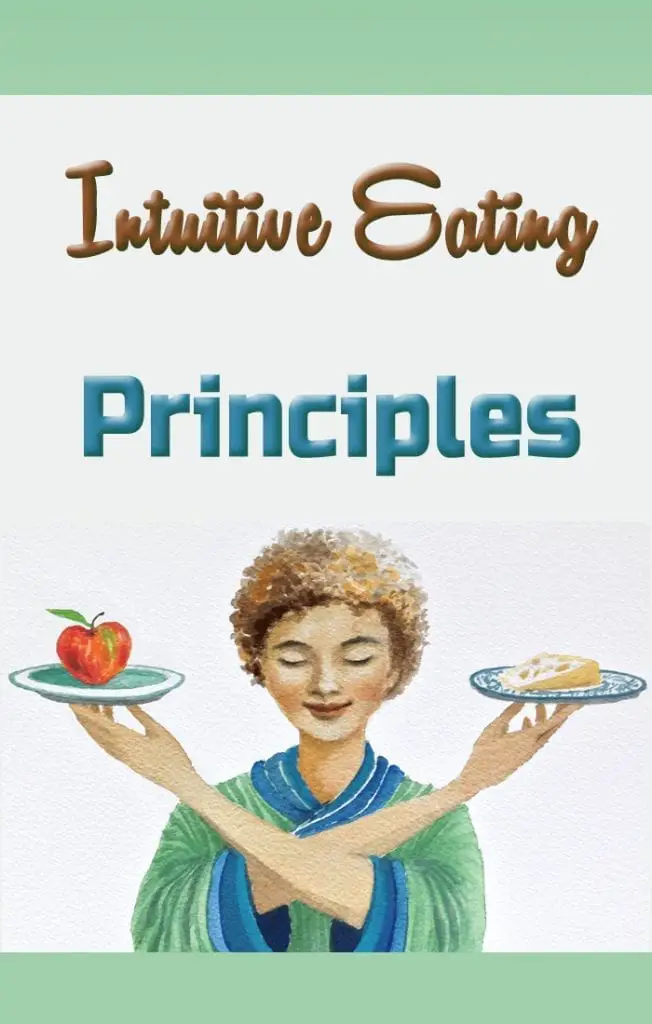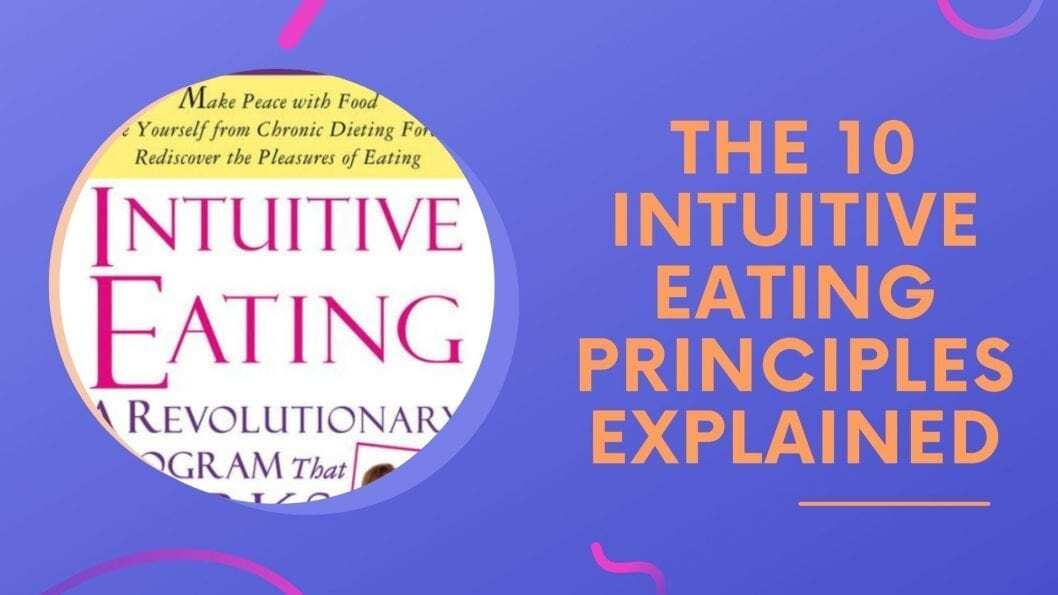Would you like to better understand the 10 Intuitive Eating Principles?
The intention of this article is to:
- Explain the original 10 Intuitive Eating Principles
- Use metaphors and analogies to more deeply understand the original 10 Intuitive Eating Principles
The original 10 Intuitive Eating Principles were first articulated by Registered Dietitians Evelyn Tribole and Elyse Resch in 1995 in their book Intuitive Eating.
Since then the book has become a best-seller, and in mid-2020 the 5th edition was released.
These 10 Intuitive Eating principles have withstood a significant test of time. They are durable and worthwhile to study.
However, conveying the incredible depth of Intuitive Eating into a single set of 10 Intuitive Eating Principles is difficult.
There is no precise definition of Intuitive Eating.
In part this is because Intuition varies – every person has their own unique intuition!
Therefore everyone approaches eating intuitively a little differently.
The rich depth of Intuitive Eating is why explaining the 10 Intuitive Eating Principles is so difficult!
Sometimes what you need to understand a complex topic is a different perspective.
Oftentimes when you hear one idea expressed slightly differently, you can then better understand the original idea.
Please note that by no means do I wish to devalue the original 10 Intuitive Eating principles!
So in this article, I’ll present the original 10 Intuitive Eating Principles.
Then for each one, I’ll provide my commentary – I’ll use various metaphors and analogies to better articulate key principles.
My hope is that for novices and beginners to Intuitive Eating can use both the original definition and the metaphors to better understand the 10 principles.
Let me know how it goes!
The 10 Intuitive Eating Principles (and 10 Metaphors)
The original 10 Intuitive Eating Principles are:
1 – Reject The Diet Mentality
2- Honor Your Hunger
3 – Make Peace With Food
4 – Challenge The Food Police
5 – Discover The Satisfaction Factor
6 – Feel Your Fullness
7 – Cope With Your Emotions With Kindness
8 – Respect Your Body
9 – Movement – Feel The Difference
10 – Honor Your Health – Gentle Nutrition
Here are the 10 metaphors I’ll use to explain these principles from a slightly different perspective:
1 – Cavemen Don’t Diet
2 – Babies Eat Enough & Feed Regularly
3 – Learn To Paint With All The Colors
4 – Failure Is The Best Teacher
5 – The Pursuit Of Happiness
6 – Learn To Ride A Bike
7 – Your Values Point The Way North
8 – Getting From Point A To Point B
9 – Health Has A Bigger Dictionary Definition Than Just Your Body
10 – Create Your Own Diet
With that being said, let’s dive in now!
If you want the definitions of the 10 Intuitive Eating Principles as defined by Evelyn Tribole and Elyse Resch read this article here.
1 – Reject The Diet Mentality

Our culture likes to pretend that weight loss will be quick, easy and permanent.
The weight loss and diet industry is worth billions of dollars. 40% of people in the United States try dieting each year.
Unfortunately, this industry is based on a lie. The lie is that weight loss is:
- easy
- quick
- permanent
This principle of intuitive eating asks you to get angry at the lies about weight loss.
The truth is simple: for most people, purposeful weight loss backfires and is harmful.
This truth can be hard to really believe because the weight loss mentality is so widespread in Western Culture.
Nonetheless, you must reject the diet mentality in order to become an Intuitive Eater.
1st Principle In Different Words: Cavemen Don’t Diet
Imagine a caveman walking into a cave 10,000 years ago.
He (or she) is wearing no clothes, has a big club, and sets his club down.
There were no scales, there were no apps to track, there were no units of calories.
There weren’t fitbits, app trackers or anything else!
Yet somehow we lived. Somehow we made it thousands and millions of years.
Without any diets.
While it’s true that cavemen were very physical and non-sedentary …
The lesson here is that you can trust your body to know when to eat, and how to eat.
You don’t need diets to tell you how to eat. Your body has the wisdom, and had the wisdom from thousands of years ago too!
Reject the diet mentality!
For another perspective on rejecting the diet mentality, check out this Eat The Banana article here.
2 – Honor Your Hunger
You must realize hunger is natural!
You must eat enough food from a caloric and nutritional perspective.
If you get too hungry, you’ll end up losing control. Instead of following your intentions to eat healthy and moderately, you’ll binge or emotionally eat.
However, if you can honor your health and eat regularly and nutritiously you’ll be able to become an Intuitive Eater.
2nd Principle In Different Words: Babies Eat Enough & Feed Regularly
When you were a baby, under ideal circumstances, your mother breastfed you.
In ideal situations, your experiences breastfeeding with your mother were both:
- sufficient
- regular
Sufficient means that you as a baby got enough milk! Because we know that babies need enough nourishment!
Regular means that you as a baby fed several times throughout the day.
This is a natural pattern that teaches us that we need to eat regularly.
3 – Make Peace With Food
Have you ever tried to ‘not eat’ certain foods?
For example, many diets tell you to stop eating sugary foods or some specific foods. But then what happens?
You begin feeling deprived …
Then these deprived feelings turn into unstoppable food cravings and binge eating!
Even worse, you’ll experience a loss of control and often feel horribly guilty afterwards.
The key is to give yourself unconditional permission to eat, while still listening to your body for signs of hunger, fullness and satisfaction.
3rd Principle In Different Words: Learn To Paint With All The Colors
Generally speaking, a painter cannot paint a masterpiece using only grays and browns!
Likewise, you cannot fully live by only eating certain foods and not eating other foods!
Plus, even from a health perspective, eliminating certain food groups often just leads to binge eating those foods you try to avoid!
A better idea is to embrace eating holistically. Let all the foods into your diet.
Of course, you don’t have to eat all the foods. But if you want food, you better start learning to let yourself have that food! Eat from a full palette!
4 – Challenge The Food Police

On your journey to becoming an Intuitive Eater …
You will have many thoughts that:
- you are ‘good’ for eating ‘healthy’
- you are ‘bad’ for eating ‘unhealthy’
- your body is ugly for not being perfect
These food rules and inner critical voices come from diet culture, as discussed in principle 1.
These thoughts are collectively known as the ‘Food Police’.
Unfortunately, you probably have had many of these critical voices ‘programmed’ into you since you were born into this culture.
In essence, the diet culture has become a police force that can make you feel like a criminal!
However, you can learn to reject this and instead rewire your brain over time to relate to your food and body thoughts differently.
4th Principle In Different Words: Failure Is The Best Teacher
How are you going to handle failure?
The inner critic will scream at you for the slightest mistakes. We need to expect the inner critic to yell and scream. Even if you do something as innocent as having one cookie!
Since the inner critic is going to yell … how are you going to respond?
Instead of perceiving failure as evidence of unworthiness …
We need to learn from failure – even smaller failures. It turns out that failure is actually the best teacher!
Indeed, wise people for thousands of years have said, “If you can learn from failure, then failure is the best teacher.”
Intuitive Eating teaches you to reflect after you make an eating ‘mistake’ to understand why, instead of criticizing yourself.
For example, here’s what you can practice thinking about instead of criticizing yourself:
- What led up to this binge?
- Did I miss a meal?
- Maybe I missed a hunger cue?
- Did I get triggered?
- Perhaps I did not eat enough ‘good’ foods?
- Did I not get enough sleep?
- Did I have a negative train of thought that I didn’t stand up to?
- Was I berating myself for a mistake when I could have forgiven myself instead?
5 – Discover The Satisfaction Factor
The simple truth is that pleasure can be found with food.
Paradoxically, you will eat less and your eating habits will normalize when you feel content and deeply satisfied from the food that you eat.
When you are in tune with your body, you will start to naturally gravitate and eat foods that make your body feel well.
When you are eating foods that truly make you feel well – not just your stereotypical ‘healthy’ foods but foods that genuinely make you feel satisfied – then you can normalize your eating.
5th Principle In Different Words: The Pursuit Of Happiness
If you feel good, you’re doing this correctly.
But prioritizing ‘feeling good’ is the opposite of what you normally hear.
Normally you hear “Just do it!”
- Just eat healthier
- Just exercise
- Just stay motivated
But “Just do it” is unsustainable, if there’s no joy or pleasure in the process.
Instead, when you place your personal pleasure about food first, then you can have a sustainable journey.
By listening to your body for what gives you genuine satisfaction you will:
- Learn what foods feel good to you
- naturally desire to eat healthier because healthier feels better
- also notice how fatigued and lazy other foods make you feel, so you’ll avoid these more
- want to eat healthier and avoid unhealthy foods not because you ‘have to’ but because your body will want to!
6 – Feel Your Fullness
Feeling your “fullness signals” is difficult. It requires the previous steps to succeed.
For example, you must be letting yourself eat what you desire as discussed in principle 3. You must also be adequately feeding yourself as discussed in principle 2. And so forth.
However, if you are beginning to practice and learn the principles …
With a little bit of mindfulness, pausing and just slowing down …
You can notice your fullness signals and these signals can be a powerful way to stop overeating.
For example, a fullness signal can be very subtle, quiet and hard to detect.
But if you know that fullness signals exist, you can begin to feel for a solid, filled up feeling in your stomach.
You can feel this signal before you get too full and bloated and know to stop eating.
6th Principle In Different Words: Learn To Ride A Bike
Instead of a meal plan or a diet to follow, Intuitive Eating is about learning skills.
- Like dribbling a ball.
- Like becoming a painter.
- Or, like learning to ride a bike.
When you first start to ride a bike, what was that like?
I am betting you fell down at least a few times.
Yet somehow you learned to balance. Somehow you learned to stay upright, and to move forward.
Eating is no different.
While you may ‘overshoot’ and eat too much …
If you can learn from your mistakes (principle 4) and continue to practice paying attention to your fullness signals …
Then you can learn to balance in due time!
7 – Cope With Your Emotions With Kindness
When you are not eating intuitively, food can act as a temporary band aid for difficult feelings and emotions such as stress.
As you learn to eat intuitively and shift your relationship with food, you won’t need to rely on food as much to feel better.
For example, instead of using food for comfort, you’ll be able to comfort, nurture, and ultimately resolve your underlying emotional issues.
However, one of the first keys to shifting your relationship with food is to start practicing kindness towards yourself.
Kindness means you are gentle with yourself when you make mistakes.
You realize that perfection is NOT a human quality, so instead of being harsh and mean towards yourself when you fall down, you respond with kindness instead.
7th Principle In Different Words: Your Values Point The Way North
Imagine a compass that points the way north.
If you get lost or confused, you can always pull out your compass and know the way back.
Kindness and knowing your values are like that compass.
If you feel confused, just know that kindness is the answer. Things will become more clear over time.
Your inner critic likes to yell and stir up the waters. Kindness can help the ripples subside so that you can see clearly.
Likewise, knowledge of your values can also help you better direct yourself when you start getting cravings around food.
8 – Respect Your Body
Not all people are meant to be skinny. For thousands of years actually, being heavier was desirable.
More fat leads to higher survival rates so people valued being bigger!
We all have an evolutionary and genetic blueprint.
If you have a bigger size, you can’t realistically become a different size.
This may be tough to hear. But even if you can’t change your size, your body can still be appreciated.
8th Principle In Different Words: Getting From Point A To Point B
Look, you may never ‘love’ your body or think that your body is ‘beautiful’.
But you can realize that your body has many positive functions:
- beating your heart automatically
- breathing automatically
- allowing you to smile and laugh
- allowing you to love others and to serve
It may be helpful to think of your body as a vehicle.
Or, you can think of your body as a temporary home for your soul.
Whatever the case, your body is what gets you from point A to point B.
Without your body, you wouldn’t exist.
9 – Movement – Feel The Difference
This simply means that your exercise should make you ‘feel’ better.
Instead of worrying about how many calories you burn, shift your attention to making your movements make you feel better.
Walking, yoga, gardening – these are all perfectly ‘healthy’ and valid forms of exercise that are more gentle and easier on the body.
Exercise doesn’t need to be tough to be ‘good’. What matters is that you feel good!
9th Principle In Different Words: Health Has A Bigger Dictionary Definition Than Just Your Body
In intuitive eating we expand our definition of health.
We include other signs of good health such as:
- Relaxation and contentment instead of continual stress
- Energy instead of fatigue
- Feeling peaceful instead of guilty or ashamed
- Being able to eat food with friends rather than isolating yourself because certain foods are off limits
Here’s the basic gist:
It’s not all about weight loss. Instead we focus on the whole person.
We focus on becoming a happier, wiser person.
If weight loss is your definition of health, you might miss that goal and miss out on happiness.
Plus, oftentimes people lose weight, but aren’t able to keep the weight off because they never transformed their inner personality and soul.
10 – Honor Your Health—Gentle Nutrition
You don’t have to be ‘perfect’ in order to be healthy!
What matters is what you consistently eat over time. As you:
- give yourself freedom
- while paying attention to your body
- while giving enough to eat
- while making sure you satisfied
- and learn to cope to with emotions differently
- and move your body to feel better
Then … you’ll naturally transform your health!
But, remember, it’s progress not perfection that counts
10th Principle In Different Words: Create Your Own Diet
There are two definitions to the word diet.
- The way someone or a community regularly eats
- A way of eating to lose weight
I’m using diet as the way you regularly eat.
You decide this!
Not some doctor or nutritionist.
You. You create your own food guidelines.
I say guidelines on purpose, instead of rules.
Guidelines are flexible. There’s no punishment if you don’t follow the guideline.
Rules imply strictness and punishment.
But if you are practicing intuitive eating …
Then you are paying attention to what works for you.
You don’t have to follow someone else’s diet.
You make your own.
You get to know YOUR body.
Who else can know your body as well as you?
Nobody!
Conclusion:
Intuitive Eating is a rich field and these 10 Intuitive Eating Principles only scratch the surface.
Hopefully something in this blog post has inspired you to learn more about the benefits of living a life rooted in intuition and authenticity.




